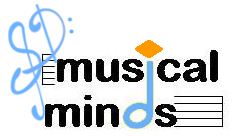Does Musical Minds teach kids to read music?
Yes! We teach them to read standard musical notation. We teach them about all of the things they’ll need to sight read musical charts.
What equipment will the student need at home?
In our Piano Keyboard Clubs we provide an individual piano keyboard for each and every participant, but the student will need something to practice on at home. Any piano or electric keyboard will do, as long it has full sized keys. If you do not have a piano or keyboard of any kind, we recommend Casio or Yamaha brand electric keyboards. Their starter models can be purchased for under $100, and you can find them at places such a Target, Costco, Guitar Center, as well as from online music equipment stores. We highly recommend Casio or Yamaha starter keyboards, (compatible with the models we use in the Musical Minds program).
What kind of songs can the kids choose from?
Each of our instructors keeps copies of sheet music from very diverse sources: nursery rhymes, current pop, classic pop, songs from movies, and classical music. Some of the songs most popular with our students in 2014 were: Let it Go from the movie Frozen, Roar by Katy Perry, Imperial March from the Star Wars series, and Happy Birthday. The sheet music for each song in our Musical Minds collection is tailored for beginner or intermediate difficulty levels.
Will there be an advanced session at school after the end of the beginner's session?
Yes. Musical Minds has its own method books, designed to take our students through four separate eight week sessions, or a total of 32 weeks. The method books teach piano technique, music theory, music notation reading, ensemble playing, and finally, songwriting skills. Students who stay with the program throughout the school year acquire a substantial amount of musical skill and knowledge!
Are group classes better than private lessons?
Kids can take private lessons anytime, but the only time that they are at the exact same level as each other is when they are absolute beginners. In a group setting, kids see the musical experience as something which isn’t a solitary process. They learn with a sense of camaraderie that only a group program can give them. The group allows them the ability to take part in musical learning games and recitals, and as they progress they have the opportunity to play together in ensemble groups, duos and trios. They have more fun and tend to want to stay with the musical learning process longer.
Will the student receive “homework” assignments, and should parents help?
Each week the students will be working on something new, such as right hand melody or left hand bass notes, and we ask the students to practice during the week. Because students will apply whatever they have learned to popular songs that they have personally selected and enjoy playing, it’s likely that the student will practice without needing to be “urged” to do so. Parents can help by making sure that the student has a keyboard or piano of some kind to practice on, and by making sure that the student keeps his/her books, songs, keyboard cards and other materials together. It’s also important that you remind the student to bring the material to the class each week.
My son/daughter has already been taking piano lessons. Can he/she still join the Piano Keyboard Club?
Yes. Just like any musical band or orchestra, our groups are made up of kids of different age groups and different skill levels. They work individually and in groups, and they benefit from working with kids having different skill levels.
How does the Musical Minds keyboard program compare in value to alternatives, such as private lessons?
We keep the cost of our program very low, relative to its value. We provide all equipment, music, teaching aids, game materials and prizes for less than half the cost one would normally pay for a one hour private piano lesson.
How far can the students go with this program?
You may have heard about studies which say that the study of music improves a child’s scholastic aptitude. Well, it’s true! Music improves a child’s Spatial Temporal Reasoning Abilities, which is their ability to visualize complex concepts such as those which are commonly found in math, science and even language comprehension. Musical Minds recognizes that the longer students stay with music, and the deeper they get, the greater the benefits. To this end we offer advanced level ensemble programs, creative songwriting programs and advanced theory programs. We also offer private in-home instruction above and beyond our group enrichment programs. Summer sessions are also offered.
Our Private Lesson Program
Many of our instructors also offer private instruction and will come to your home. We offer sibling discounts and special home group rates. Contact us for more information.

